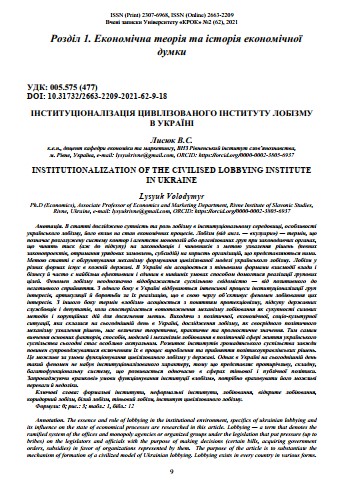INSTITUTIONALIZATION OF THE CIVILISED LOBBYING INSTITUTE IN UKRAINE
DOI:
https://doi.org/10.31732/2663-2209-2021-62-9-18Keywords:
formal institutions, informal institutions, lobbying, open lobbying, corridor of lobby, white lobby, black lobby, institution of civilized lobbyAbstract
The essence and role of lobbying in the institutional environment, specifics of ukrainian lobbying and its influence on the state of economical processes are researched in this article. Lobbying — a term that denotes the ramified system of the offices and monopoly agencies or organized groups under the legislation that put pressure (up to bribes) on the legislators and officials with the purpose of making decisions (certain bills, acquiring government orders, subsidies) in favor of organizations represented by them. The purpose of the article is to substantiate the mechanism of formation of a civilized model of Ukrainian lobbying. Lobbying exists in every country in various forms. In Ukraine it is associated with shadow forms of interaction between government and business and frequently is the most effective and in current conditions the only way to achieve the realization of group goals. The phenomenon of lobbying is displayed ambiguous by the public consciousness — from positive to negative perception. On one hand, intensive processes of institutionalising groups of interest, articulation and struggle for their realization are happening in Ukraine which in turn objectifies the phenomenon of lobbying for these interests. On the other hand the term “lobbying” is associated with the term of protectionism and bribing government officials and deputies when “identification of lobbying mechanism as totality of force methods and corrupt actions for achieving the goal” is observed. Based on the political, economical and socio-cultural situation that formed in Ukraine at present the research of lobbying as a peculiar political mechanism of decision making has a huge theoretical, practical and prognostic value. Thus the study of main factors, ways, models and mechanisms of lobbying in the political area of the ukrainian society’s life becomes especially relevant at present. The development of the civil society’s institutes should be always accompanied by including them in the process of making decisions regarding political management. This is possible provided the functioning of civilised lobbying in the country. However such a phenomenon has not acquired institutional nature in Ukraine for today because it represents a contradictory, complicated and multifunctional system that is developing in the areas of shade and public politics at the same time. Introducing the “frame” conditions of functioning of the “lobbying” institution, its possible advantages and disadvantages need to be considered.
Downloads
References
Business and Society: Corporate Strategy, Public Policy. William C. Frederick, James E. Post, Keith Davis. New York, 1996.
Мельник А. Ф., Длугопольський О. В. Публічний сектор і державна політика в демократичному суспільстві : монографія. Тернопіль: Економічна думка, 2008. 173 с.
Trends in Grassroots Lobbying. URL: http://www.advertising.about.com.
Бондаренко А. Лобіювання по-українськи. Тиждень. 2008. №3(11). С. 24-25.
Зущик Ю. Лобізм – корупція – реформи. Контекст. 2001. №7.
Мишутин С. Обыкновенный лоббизм. Аргументы и факты в Украине. №41. 2005. С. 9.
Нуреев Р. М. Курс микроэкономики: учебник для вузов. Москва : Норма, 2005. 576 с.
Brown C. V., Jackson P. M. Public Sector Economics. Oxford : Oxford University Press, 1990. 622 p.
Buchanan J. M. The Public Finances: An Introductory Textbook. London, 1970. 492 p.
Goldstein K.M. Interest Groups, Lobbying and Participatign in America. Cambridge University Press, 1999.
Handbook of Public Economics / By A.J. Auerbach&M. Feldstein. Amsterdam : North-Holland, 2002.
Wolpe B. C., Levine B. J. Lobbying Congress: How The System Works. Washington : Congressional Quarterly Inc., 1996.



